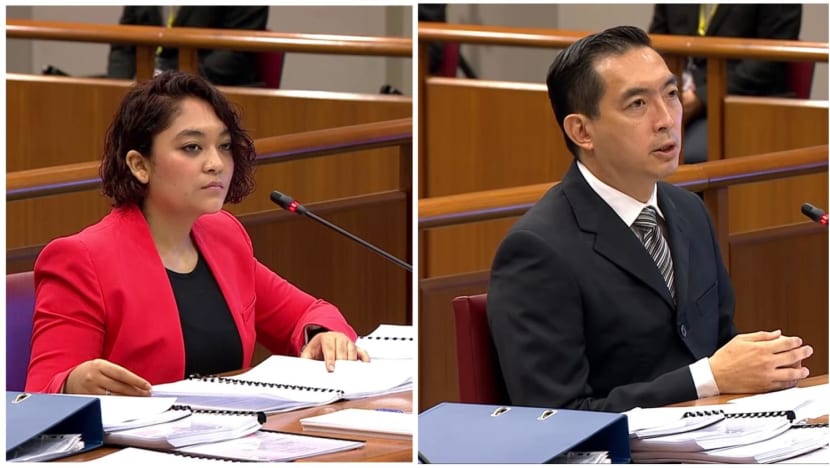Raeesah Khan stands by her evidence; psychiatrist says she did not have any disorder that would 'predispose' her to lying: COP report
Ms Raeesah Khan and psychiatrist Dr Christopher Cheok appearing before the Committee of Privileges on Dec 22, 2021. (Image: YouTube/govsg)
Chew Hui Min
22 Dec 2021 10:47PM (Updated: 22 Dec 2021 11:10PM)
SINGAPORE: Former Workers' Party (WP) Member of Parliament Raeesah Khan maintained that the party's leaders did not tell her to clarify a lie she had told in Parliament, according to a summary of further evidence she gave on Wednesday (Dec 22) to the Committee of Privileges (COP).
This is Ms Khan's second time appearing before the committee, which is looking into a complaint against her for lying in Parliament.
She admitted that she had lied in Parliament on Aug 3 about a sexual assault case, and had repeated the lie on Oct 4.
On Nov 1, Ms Khan admitted in Parliament that she had lied about accompanying a sexual assault victim to the police station because she was a survivor of a sexual assault. She also said she did not want to reveal that she had heard the anecdote in a support group.
She subsequently resigned as an MP and from the WP.
When questioned by the COP on Dec 2, Ms Khan said that she had told WP leaders at a meeting on Aug 8 about the lie and was then told to "retain the narrative", which she took to mean that she should continue lying.
She also sent a text message on Aug 8 to two aides - Ms Loh Pei Ying and Mr Yudhisthra Nathan, telling them that WP leaders had told her to "take the information to the grave". Ms Loh and Mr Nathan had given evidence corroborating Ms Khan's account.
ADVERTISEMENT
But WP chief Pritam Singh told the COP that this conversation did not take place, and that there had been no discussion during the meeting about whether or how to correct Ms Khan’s untruth.
"EXTREMELY OUT OF LINE"
In addition, he suggested to the COP that Ms Khan suffered from "disassociation" due to past trauma and asked that she undergo a psychiatric assessment.
In her testimony to the COP, WP chair Sylvia Lim also said that Ms Khan was "doing things without thinking about what she was doing".
She said that Ms Khan submitted documents to a WP disciplinary panel from a psychotherapist, with indications that Ms Khan was suffering from post-traumatic stress disorder (PTSD) and that she is undergoing therapy.
The Office of the Clerk of Parliament said in a press release on Wednesday that the Committee invited Ms Khan to undergo a psychiatric assessment.
She agreed and saw Dr Christopher Cheok, acting chief and senior consultant at the department of forensic psychiatry at the Institute of Mental Health, on Dec 17 and Dec 20.
Responding to the claims by Mr Singh and Ms Lim about her mental state, Ms Khan said that it was "extremely out of line" for them "to have used mental illness as a means to discredit someone", according to the summary.
"Mr Singh had tried to paint a picture of her as someone who was mentally unstable, when she was of sound mind," said the report from the COP summarising the key points of Ms Khan's testimony.
"TAKE IT TO THE GRAVE" SAID BY MR SINGH: KHAN
On what happened at an Aug 8 meeting with Mr Singh, Ms Lim and Mr Faisal Manap, Ms Khan said that their evidence was untrue.
According to her, the words “take it to the grave” were used by Mr Singh, in front of Ms Lim and Mr Faisal. She said that this was not a phrase she would "ordinarily use", the COP report said.
ADVERTISEMENT
She added that there was no discussion during the meeting on whether she should disclose the sexual assault to her father and family, which Mr Singh claimed he had told her to do.
Mr Singh and Ms Khan had also given differing accounts of an Oct 3 meeting at her house, a day before the Parliament sitting where she repeated her lie when questioned by Home Affairs and Law Minister K Shanmugam.
Ms Khan had earlier told the COP that during this visit, Mr Singh told her that if she kept to her existing narrative, there would be "no judgment".
But Mr Singh said he told Ms Khan that “if the issue came up”, Ms Khan had “to take responsibility and ownership of the issue”, and if she did so, he “will not judge” her.
Ms Khan said that Mr Singh had never said the words “take ownership and responsibility” to her, nor did he tell her to clarify the lie in Parliament.
LIED AGAIN AS MR SINGH DID NOT REPLY TO HER MESSAGE
On the day of the Oct 4 Parliament sitting, Ms Khan sent Mr Singh a message, asking: “What should I do, Pritam?”.
When asked about this, Ms Khan said that she was waiting for Mr Singh to respond to her message, to give her guidance about what she should do. As Mr Singh did not reply to her, she lied again.
Later that night, sometime past 11pm, Ms Khan met Mr Singh and Ms Lim in the office of Leader of the Opposition.
Mr Singh previously said that Ms Khan was "in a daze" and had said: “Perhaps there is another way. That is, to tell the truth.”
Ms Khan agreed that she said those words, but disagreed that she had been "in a daze" when she said those words.
Ms Lim had said that Mr Singh responded by asking Ms Khan if she "hadn’t already chosen a path", the report said.
Ms Khan testified that she was "shocked" by Mr Singh’s response because there was "no intention or directive" from him to tell the truth at the time, said the COP report.
Ms Khan told the committee that Mr Singh had not presented her with a choice on Oct 3, but had told her that "if she continued the narrative, he will not judge her", the report said.
DOES NOT HAVE DISSOCIATION
She told the committee that she did not say she had disassociation. She clarified that she mentioned to the WP disciplinary panel that she may have symptoms of PTSD.
When asked what symptoms they were, she said one of the symptoms was dissociation, but had never said that this was something that she was going through.
Dr Cheok explained that dissociation is a symptom, not a medical diagnosis. It refers to the loss of the integrative function of the mind, and may be experienced by normal people in different situations, said the report.
The psychiatrist gave evidence to the committee after assessing Ms Khan and interviewing her husband, and said that she "did not suffer from any significant psychiatric disorder that would have impaired her ability to speak truthfully" in Parliament or before the COP.
"Dr Cheok said that Ms Khan did not suffer from any psychiatric disorder that would predispose her to telling untruths," added the report.
"Having been in practice for more than 25 years, he said that persons with psychiatric disorders do not generally tell untruths more frequently than any other human being."
Dr Cheok also said that Ms Khan did not have PTSD and did not suffer from "any significant or material dissociation during the material period".
"While Dr Cheok did not deny that Ms Khan had some symptoms of being psychological traumatised, he was of the view that the symptoms did not reach the threshold of a psychiatric disorder," said the COP report.
"In his view, it was a normal reaction for someone who had gone through a traumatic experience, to continue to have some anxiety when speaking about the topic. This did not mean that the person would be mentally impaired or incapacitated."
"OF SOUND MIND"
He testified that her judgment and decision-making capacity was not impaired and that she was of sound mind.
Dr Cheok was also asked if it was possible that Ms Khan’s judgment could have been affected by the trauma, in a way that caused her to have “false memory creation”.
He reiterated that Ms Khan did not suffer from dissociation and that in his assessment, when Ms Khan spoke of her assault, she was "not affected to an extent that caused her to lose her mental capacity".
He was then asked whether a person who is suffering from trauma, while still generally high functioning, could be "capable of sending out a message that selectively contained a lie".
"Dr Cheok said that generally it is possible but there also may be other explanations why a person may give a falsehood. However, in the specific context of Ms Khan, Dr Cheok disagreed with this possibility," said the COP report.
Source: CNA/hm(mi)



